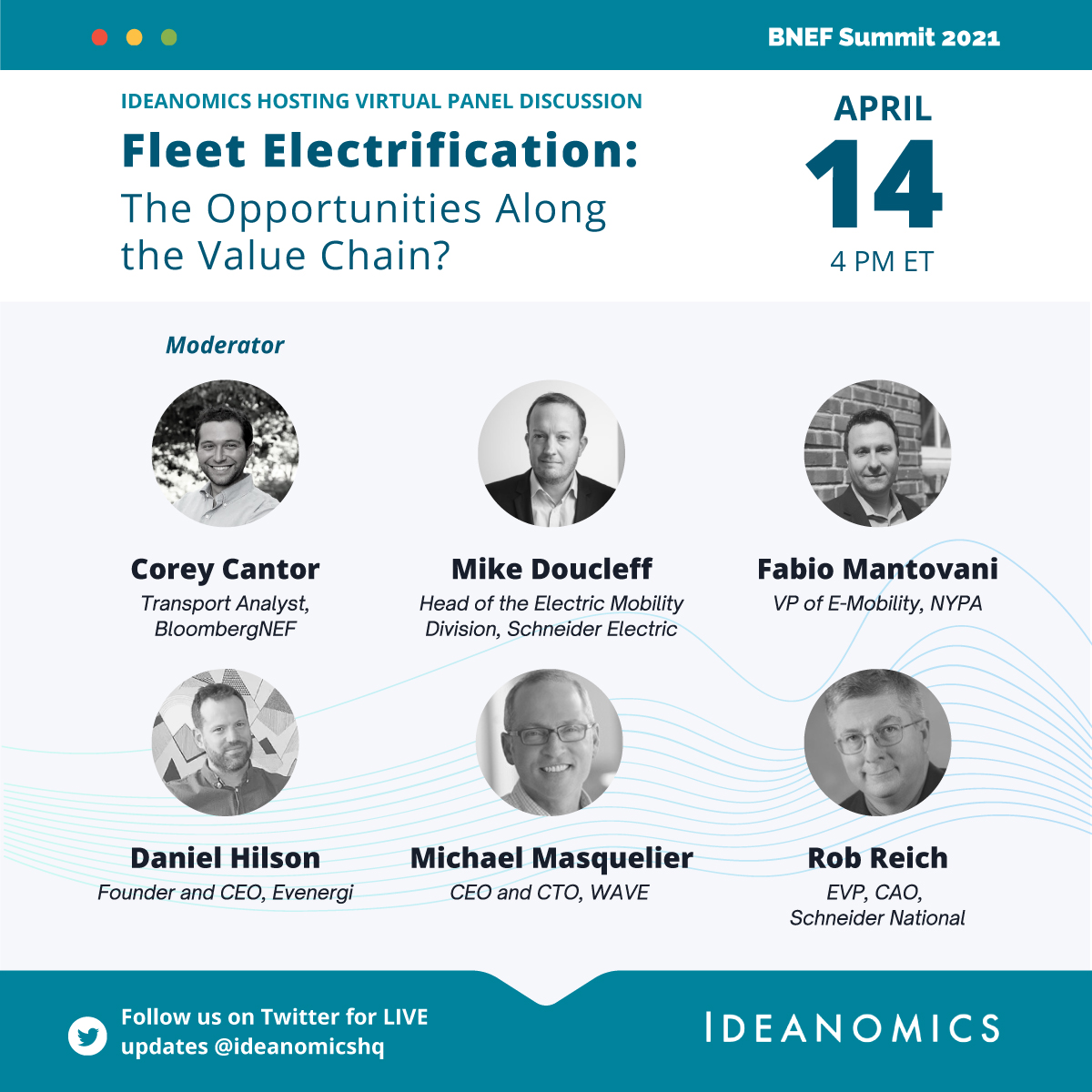Ideanomics: Taking Center Stage at the BNEF Summit
BNEF Summit 2021
Fleet Electrification: The Opportunities Along the Value Chain
Panelists:
- Fabio Mantovani, Vice President of e-Mobility at the New York Power Authority
- Rob Reich, Executive Vice President, Chief Administrative Officer at Schneider National
- Mike Doucleff, the Head of the Electric Mobility Division at Schneider Electric
- Daniel Hilson, Founder and CEO at EVenergi
- Michael Masquelier, CEO and CTO of WAVE
Moderator:
- Corey Cantor, Transport Analyst, BloombergNEF
Beginning tomorrow at 8:30 am ET, Bloomberg will be hosting its latest virtual BNEF Summit in New York, where energy, finance and technology will once again converge. The Bloomberg New Energy Finance Summit is an invitation-only event for global fleet and OEM senior executives, policymakers and investors. Their goal is to identify and address key issues facing global fleets, and OEMs in the clean energy sector, and to help decision-makers identify opportunities that will enable them to succeed.
Ideanomics, a 2021 sponsor, will not only be in the virtual building, but we will be hosting a panel discussion on the fleet electrification value chain. Separately, our CEO Alf Poor will participate in a Q&A discussion about the benefits of having a global footprint in the movement toward electrification. While you may not be able to see the event live, we have you covered as we will be providing live updates via Twitter and will also publish a recap
Fleet Electrification: The Opportunities Along the Value Chain
Our panel discussion, Fleet Electrification: The Opportunities Along the Value Chain, will focus on customer needs and concerns as they pertain to fleet electrification along the value chain. As electrification has spread from passenger vehicles to mass transit, drayage trucks, and even 100% electric, zero-emission tractors, the business model for growing a product or service from an idea into something useful (and better for us!) has sprouted new complexities. This also poses major challenges for fleet operators and raise questions around a centralized charging infrastructure and the impact of these electricity loads on the distribution infrastructure for grid operators.
We are very excited to share with you our esteemed group of expert panelists who will come together this Wednesday at 4:00 pm EST. From their own unique points of view, these zero-emission focused executives will discuss the opportunities for technologies to address the concerns and reduce the grid load as well as infrastructure costs.
Finding Solutions along the Value Chain
Getting the show started and keeping the conversation moving along will be moderator Corey Cantor, Transport Analyst, BloombergNEF, who is also part of Bloomberg’s electrified transport team. His background spans policy, economics, and technology and he understands how they impact the electrification of mass transportation in the North American market. Prior to completing his master’s degree in Environmental Management from Yale’s School of the Environment, Corey worked for U.S. Senator Cory Booker on his economic team covering policy around banking, taxes, and the federal budget.
In order to build an electric mobility infrastructure and deploy a zero-emissions fleet, a critical piece of your operation is going to be the need for energy. Fabio Mantovani Vice President of e-Mobility at the New York Power Authority, the nation’s largest state public power organization, promotes energy efficiency, new energy technologies, and electric transportation initiatives. More than 70 percent of the electricity produced by NYPA is clean renewable hydropower. This power is then sold to government agencies, community-owned electric systems, and rural electric cooperatives as clean energy solutions.
Electric energy is especially important to Rob Reich, Executive Vice President, Chief Administrative Officer at Schneider National, a premier provider of transportation, logistics, and intermodal services. Now in his 29th year at Schneider, Mr. Reich manages a fleet of 9,000 company trucks. He has already acquired and tested electric trucks and plans to add 15-20 zero-emissions vehicles to his fleet by the end of the year. His customers and drivers have been talking to him about the benefits of an electric fleet and now for him it’s a matter of building infrastructure, solving charging issues, and training drivers and operators. Before joining Schneider, Reich served as an officer in the U.S. Army and was a member of the 1st Cavalry Division at Fort Hood, Texas.
Mike Doucleff, the Head of the Electric Mobility Division at Schneider Electric (not be confused with Schneider National), has made it his mission to create safe, reliable, efficient and resilient charging solutions that lead to cleaner mobility. Schneider Electric believes electricity is the most efficient and best solution for decarbonization and for making a climate-positive impact. His global team of R&D, commercial, and support function professionals, collaborate within an ecosystem of innovative partners in Europe, China and the United States to bring low and medium voltage products, solutions, and services to a more digital and environmentally conscious world.
Daniel Hilson, Founder and CEO at EVenergi, offers customizable fleet and software solutions to electrification. EVenergi is a global zero-emissions transport advisory that leverages its BetterFleet and GridFleet platforms to help fleets to plan, implement, and manage fleet migrations. Daniel’s experience involving major zero-emissions transport projects runs deep and his clients the NSW Government, Australian Federal Government, ACT Government, Welsh Government, Go-ahead Singapore, South Australian Government, DHL, AGL, and hundreds of local governments, bus operators, and logistics companies. If you haven’t done so already, be sure to take a at EVEnergi’s newest tool, GridFleet, electric vehicle network forecasting for distribution network service providers.
One of the biggest issues for operators wanting to migrate to electric fleets is developing a charging plan. In fact, the issue of charging for mass transit and long-distance trucking had once been a major sticking point. But kudos goes out to panelist Michael Masquelier, CEO & CTO, WAVE who tackled this problem head on and will tell us about how he and his team at WAVE developed today’s market-leading wireless charging solutions for commercial electric vehicles. Responsible for the largest deployment of wireless charging in the US, WAVE has addressed concerns about how fleets can travel safer, further, and charge more easily, while maximizing the life of EV batteries. Before co-founding WAVE, Michael led sensor design efforts at Motorola’s semiconductor division. He holds patents in wireless power transfer, power electronics, and microelectronics and is the co-chair of the SAE J2954 Heavy Duty standards committee on wireless charging of electric vehicles.
The Importance of a Global Footprint
On Tuesday, at 11 am ET, Ideanomics CEO Alf Poor will participate in a brief Q&A discussion with Veronika Henze, who heads corporate communications for BloombergNEF. They will cover the benefits of having a global footprint, market projections in the short, medium, and long term, and the broad approach these companies are taking in the movement toward fleet electrification. Mr. Poor is currently the CEO of Ideanomics (Nasdaq: IDEX), a global company focused on technology-enabled disruption to the automotive and financial services industries.
Topics that address the entire value chain of fleet electrification is still a void in the industry. That’s why Ideanomics fills a much-needed vacancy in the commercial EV realm by helping to facilitate the switch to EV for mass transit, trucking, and tractor fleet operators. Boasting a diverse portfolio that includes companies such as wireless charging innovator, WAVE, electric tractor provider Solectrac, Malaysian electric scooter/moped maker Treelectric, and Italian electric motorcycle manufacturer Energica, Ideanomics is committed to accelerate fleet electrification via unique business solutions across the value chain addressing vehicle, charging and energy.
Wednesday’s discussion promises to cover the full spectrum of fleet electrification, answer questions and concerns, and share proven viable solutions.

